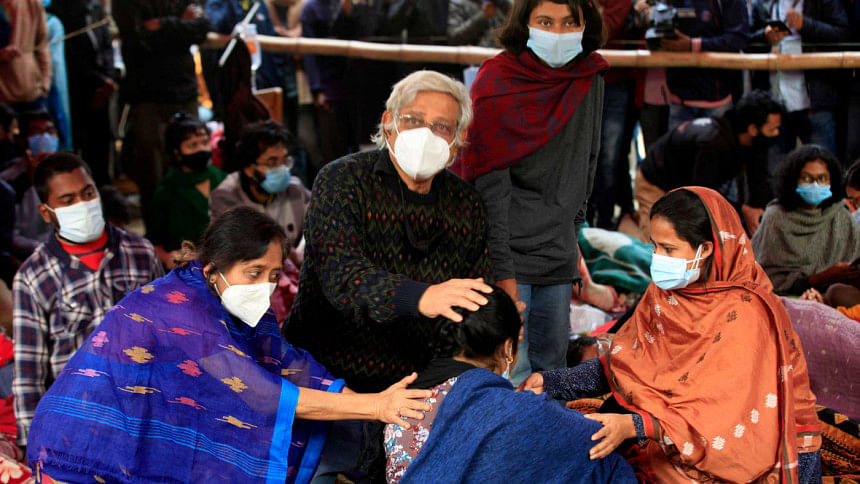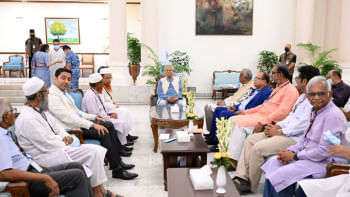Let the promises made to SUST students be fruitful

On January 26, Dr Muhammed Zafar Iqbal reached the campus of Shahjalal University of Science and Technology (SUST) at 3am to meet the demonstrating students. The media covered his journey in detail, which makes it hard to believe that SUST teachers and the teachers' association there missed the coverage. Some "highly placed" decision makers of the government also visited Dr Iqbal and Dr Yasmeen's home before they started for Sylhet. It is unlikely that the teachers and their association, or in other words, the politicians and their association, were oblivious to these developments. However, at the time of students ending their 163-hour-long hunger strike, none of the teachers were present. Some were out on a "morning walk" and came across Dr Iqbal, though.
Some of the teachers brought dinner for the confined vice-chancellor. The students barred them from entering, but allowed the police to take the food inside. A few hours before, police had forcibly shut down all food outlets on the campus, making it impossible for the demonstrating students to get food. The previous night, police detained five former students for donating money for the students' cause. When the teachers brought food for the VC, the demonstrating students as well as others were starving. But the teachers did not utter a single word against the closing of food shops. The medical treatment facility was also shut down. Teachers kept mum through all this. Evidently, police did not take these actions without the express will and consent of the administration. That is, the VC.
Dr Iqbal has written an illustrative write-up regarding the student's demonstration. He negotiated with the government, went to Sylhet and convinced the students to end the hunger strike. He acted like any responsible and sensible teacher would. He referred to VC Farid Uddin as a "monster". He donated Tk 10,000 out of his own pocket for the cause. He also spoke of the brutality of police, who mercilessly beat protesting students and hurled sound grenades without any reason.
It is now clear that the VC instructed the police to attack students. But who ordered the capturing of the five former students? Who filed the cases? Who orchestrated the closure of the treatment facilities and food shops within the campus?
Naturally, it is clear that these instructions could not have come solely from the VC or the university administration. Without an explicit signal from the government's higher ups, it is not possible for the police to shut down students' mobile banking accounts. Thus, if the discussion stays confined to what the police or the VC did, the main issue will remain concealed.
The teachers of SUST or the teachers' association did not stand beside the students, neither when they were exposed to police brutality nor afterwards. However, the statement given by the SUST teachers' association had a somewhat constructive tone. The teachers' association of Dhaka University termed the students involved with this movement as a "third party", and defined the movement itself as an "anti-government initiative". Firstly, they failed to understand the disgruntled mind-set of the students which fuelled the crisis. Also, even if the movement were of an anti-government nature, why would the DU teachers' association feel the necessity to speak on behalf of the government? Surely, the government can defend itself against any supposed anti-government activities?
Just like most professions in Bangladesh, teaching is also contaminated by politics. When some SUST teachers made opponents out of the students and organised a human chain, it was quite distasteful. Their students were beaten, wounded by rubber bullets and sound grenades, but they did not protest. Instead, they made up an allegation that the protesting students had been "disrespectful". As if the respect that they had lost by hurting the sentiments of students could be recovered through such petty measures.
Dr Zafar Iqbal made some promises to the protesting students which prompted them to end the strike. However, those promises seemed unaligned with the tone of the education minister. Although the students submitted a five-point demand, their main demand is the removal of the VC, either by force or through voluntary resignation. The education minister promised that "all demands will be met", but followed it up with a non-committal statement: "The VC's resignation cannot solve all issues."
However, we must remember that the VC's resignation/removal and finding a solution to the students' problems are two different issues. The exit of VC Farid would translate to acceptance of the students' demands. After the VC's exit, we can shift our focus towards solving the remaining issues—which cannot be resolved while this VC is holding the fort.
If the government truly wants to make public universities accommodating of general students, they have to acknowledge the existing problems first. The first step towards this realisation would be to stop appointing political leaders in the guise of teachers as VCs. Teachers who have high levels of administrative skills and honest mind-sets, whose financial dealings cannot be questioned, and are sympathetic towards the pleas of students deserve the chair of VC. The control of common rooms, guest rooms, and student halls need to be snatched from the ruling party's student wing and given back to the university administration. The proctorial body of a university should consist of honest, skilled and deserving teachers, not people who act as political cadres.
There is a dearth of acceptable personalities in our society. As such, the government is lucky that Dr Zafar Iqbal intervened on their behalf. So if the plight of ordinary students doesn't move them, they should at least try to preserve Dr Iqbal's acceptability which can only be done by fulfilling the promises he made to the protesting students.
Golam Mortoza is a journalist at The Daily Star. The article was translated from Bangla.

 For all latest news, follow The Daily Star's Google News channel.
For all latest news, follow The Daily Star's Google News channel. 



Comments